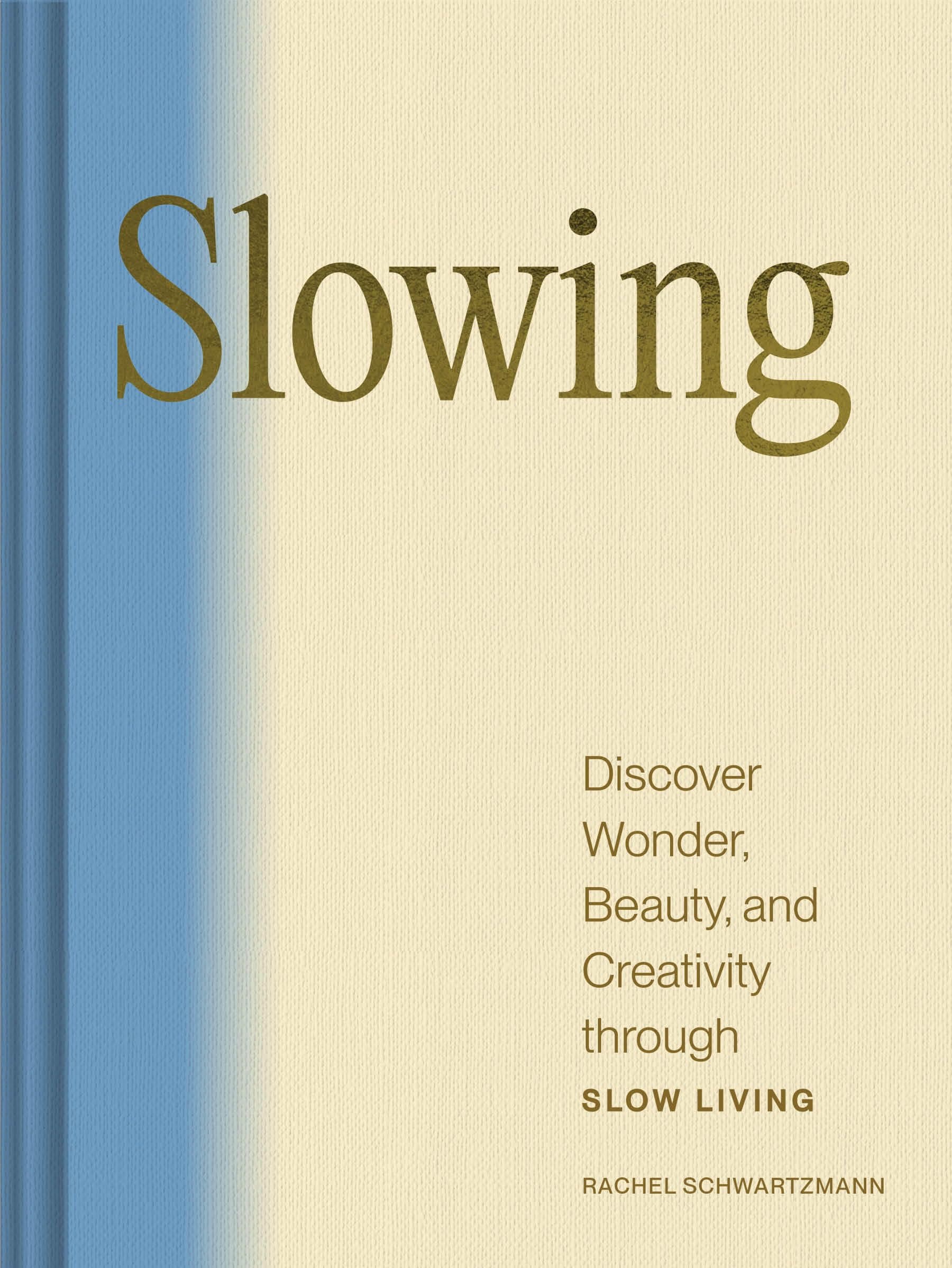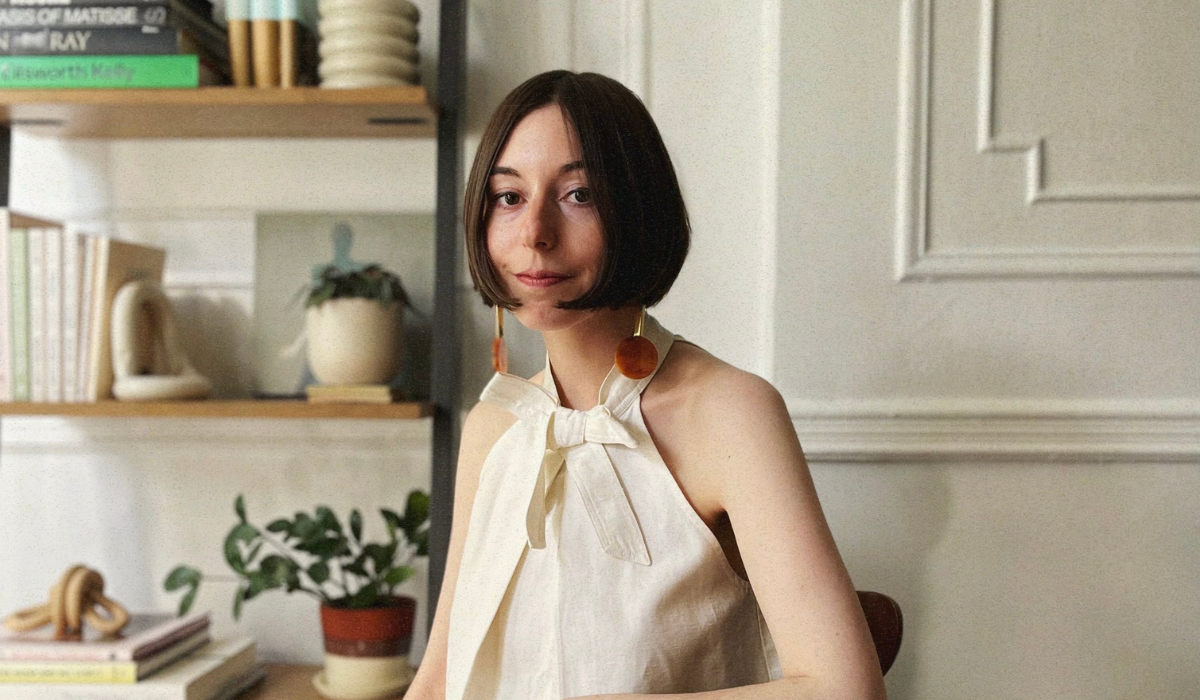In a Frenetic and Noisy World, Author Rachel Schwartzmann Shows Us How to Slow Down and Embrace a Calmer Pace
"After spending so much time living in service of external validation, I became depleted."
So says Rachel Schwartzmann. As the author and writer tells us, she had long wrestled with a tendency to prioritize output. A fear of "what's going to happen?" loomed in her mind if she failed to move instantly and fast. And while Schwartzmann was doing incredible things, including running her own blog-turned-business for nearly a decade, she found herself drained and not feeling "fully at home in myself," she says. "Especially in the age of millennial-led startups and the fast-growth mindset, it was easy for boundaries to dissolve."
The key back to herself was a shift toward deeper intention and a gentler pace. Schwartzmann closed her brand, returned to her first love, writing, and began exploring her relationship to time and pace—"and the stories we tell ourselves about living, working, and creating in our current landscape," she says. She dived into this in her podcast and subsequent newsletter, "Slow Stories," where she spoke to others about slowing down.
Through letting up on the gas, Schwartzmann found her footing. Most recently, she poured her insights into a book, Slowing: Discover Wonder, Beauty, and Creativity through Slow Living. A thoughtful, intentional work filled with reflections and learnings, Slowing serves as much a guide as it does a reminder: Through quieting and easing, we find enrichment and deeper truths—and ultimately, ourselves.
A CONVERSATION WITH RACHEL SCHWARTZMANN
In your introduction, you write, "I genuinely believe there is a more nuanced conversation to be had about living in a landscape that constantly competes for our attention." What concerns you about the pace these days, with its social media and 24-hour news cycles? What do you hope people will be more aware of?
Slowing, in many ways, stems from my podcast/newsletter, Slow Stories, and my interest in reimagining our relationship with time and pace and the stories we tell ourselves about living, working, and creating in our current landscape. In the early days, I focused the podcast conversations on the slow content movement, which, like slow living, prioritizes quality over quality and mindful consumption and creation. I think that's relevant to what many of us are striving for now. We're speaking during a heightened moment where these things—social media, 24-hour news cycles, et cetera—feel particularly pervasive, but I hope people know that our relationship with them will ebb and flow.
I also hope people don't get too caught up or distracted by what outside influences say they don't have and let what they do have serve as a foundation to build upon. For me, that foundation, both personally and professionally, includes continuing to make space for tangible creativity:
- Noticing how the light changes throughout the seasons.
- Writing in a journal or making a mood board.
- Sitting with a physical book.
- Enjoying the quiet company of loved ones.
So much of my life before stepping into my writing practice and conceiving Slowing was focused on content versus contentment, the extraordinary versus the ordinary. Don't get me wrong, I'm grateful for the many incredible life experiences I've had and still want room for them, both online and offline. But I also make it a point to deeply honor and appreciate the little things.
I recently came across this quote from the novelist Orhan Pamuk, which I loved and is applicable here: "From tiny experiences we build cathedrals."
How do you describe the practice and choice of slowing down?
I still believe that slowing down is a very private and individual practice. We all have demands and responsibilities that shape our decisions and days, and some people tend to think that slowing down or engaging in slow living requires a dramatic lifestyle shift. For me, it's a mindset shift more than anything.
I often say that I equate slowness with self-awareness: Taking the time to understand where you are, what you want, your limitations, and your hopes can help chart a sustainable path towards a slower life—or even a single chapter in your slow story. With that in mind, I've also said that I don't think it's possible to be slow constantly. Certain things require urgency. It's just a manner of reacting to those more intense moments with intention.
For me, slow storytelling is at the root of my practice. I choose to engage with language, words, ideas, and stories that make me feel something. I'm always at my slowest and most present when I'm with story and narrative; when I'm reading, writing, and making.
You fill Slowing with heartfelt questions and dedicate a section to curiosity. I'd love to explore the richness of asking. How is the act of asking questions integral to slowing down? And considering your prompts around asking, what is one question you can offer Sunday Paper readers to help us slow down?
I love how you framed that: the richness of asking. I didn't always associate asking questions with slowness, even though, in many ways, it's an inherently slow and thoughtful thing to do. On the other hand, questions can be used to fill silences—when silence is what's most needed—or to distract or pivot away from uncomfortable conversations. But at their core, questions demonstrate curiosity—to me, where it gets really slow is when you turn them inward.
As I mentioned in the essay "How to Ask a Question," I love asking: What is one question you wish people asked you more often? Whenever I pose it to my guests in my Slow Stories interviews, there is either an immediate silence or a delighted "Oh!" I consider it an opportunity for people to think outside the box of what they usually talk about or are expected to talk about. That seems to be a recurring thread throughout this conversation: releasing expectations of how things should look and focusing on how they feel. So, put simply, that question always slows down the people in my life and might be a good starting point for Sunday Paper readers, too.
It's heartening to read about how your rabbit, Pepper, has taught you to slow down and "appreciate little moments from ordinary vantage points," as you write. For those of us seeking a place to start, will you offer us a prompt from that section of the book to help us slow down and shift our perspective?
I'm so glad to hear it resonated with you! I touched on this earlier in our conversation, but sometimes, it only takes small things—or, in the case of Pepper's story, beings—to inspire big changes in perspective. So, if I were to offer one prompt, I would choose: "Sit on the ground and write about what you see or feel from this level."
Rabbits don't love to be picked up, so I often sit next to Pepper on the ground, as I write about in the book. Spending time with her this way has been a wonderful change of perspective. It's a reminder that you can sit down but still look up—and ahead. You can be still and still feel moved by ordinary delights.

Rachel Schwartzmann is a writer based in New York. She writes and hosts Slow Stories—a project that explores living, working, and creating more intentionally in our digital age. Learn more at rachelschwartzmann.com.
Please note that we may receive affiliate commissions from the sales of linked products.



